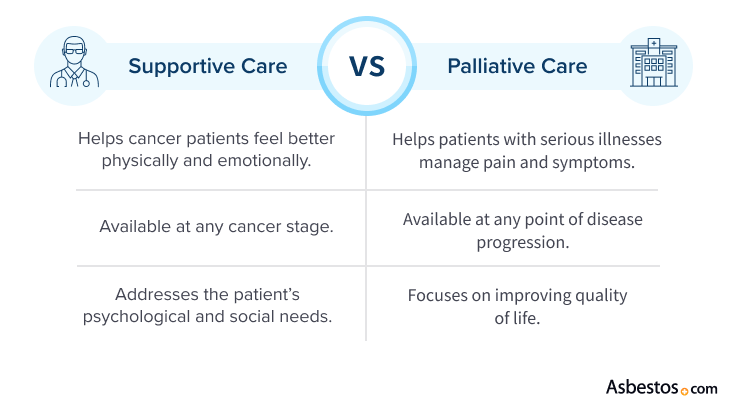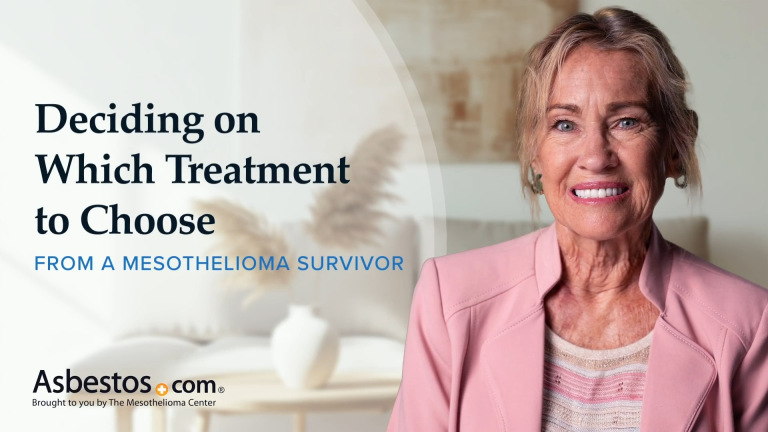
Access expert diet and exercise guidance designed specifically for mesothelioma patients to support treatment and overall wellness.
Get Your Free GuideMesothelioma supportive care includes treatments that help manage symptoms, improve comfort and enhance quality of life. Unlike curative therapies, supportive therapy for mesothelioma focuses on symptom relief, pain management and emotional well-being.

Supportive therapy for mesothelioma makes it easier for people to cope. Mesothelioma can cause several difficult symptoms. Supportive care aims to make life easier and more comfortable.
Key Facts About Mesothelioma Supportive Care
Supportive care might involve medicine for pain, help with daily tasks or counseling. The goal is to help you live as full a life as possible, even while dealing with cancer. Every person’s experience with mesothelioma is different. Health providers tailor supportive care to each patient.
Supportive care is available at any stage of disease progression. Mesothelioma treatment guidelines recommend supportive therapies to help people through treatment and recovery.
After a mesothelioma diagnosis, you might hear about supportive care and palliative care. While they share some goals, there are some differences. Both aim to help you through treatment. But they focus on different things.
Supportive care is like a broad umbrella of help. The Multinational Association of Supportive Care in Cancer says supportive care is for the “prevention and management of the adverse effects of cancer and its treatment.” It seeks to improve life for those with mesothelioma, in both body and mind. This means helping with pain and tiredness. It also means supporting feelings like sadness and worry. Supportive care is available at any stage. This includes care for new diagnoses and more advanced cases. It also looks at a person’s physical and social needs.
Palliative care for mesothelioma focuses more on managing pain and relieving other symptoms. It improves quality of life and makes someone feel more comfortable. Like supportive care, palliative care can be given at any point in the illness. Supportive care takes a broader approach and looks at the whole person.

Mesothelioma pain is a common challenge for patients. Supportive care focuses on managing this pain to help you live as comfortably and actively as possible. This usually means using different methods that fit your individual needs.
Pain Management Options
Pain management is important at every stage of mesothelioma. It can help manage pain from the cancer and treatment side effects. As mesothelioma progresses, pain management might become the focus of care.

Exclusive Content
Linda Hooper: Deciding on Which Treatment to Choose – From a Mesothelioma Survivor
Mesothelioma causes progressive breathing problems. Supportive care helps you breathe better and enhances quality of life. The approach focuses on managing symptoms and providing personalized care.
This might involve different therapies and working with a team of health care professionals. The goal is to help you breathe easier.
Breathing Support Options
These therapies are often available in hospitals, cancer centers and specialized clinics. You can talk to your doctor about which options might be best for you.
A team of health professionals can provide these treatments and support. Examples include doctors, nurses, respiratory therapists and physical therapists. They work together to create a plan that meets your specific needs.
Eating well is important for people undergoing mesothelioma treatment. Good nutrition can help you stay strong and manage the side effects of treatment.
A high-protein diet is often recommended to help maintain muscle strength. Prioritizing nutrition can boost energy, improve overall well-being and enhance your treatment tolerance.
Nutrition Tips for Mesothelioma Patients
“Try to remember to eat small, frequent meals,” says registered and licensed dietitian Tejal Parekh. “Instead of eating 3 large meals a day, break your meals up into perhaps 5 or 6 smaller meals.”
A registered dietitian can make a mesothelioma nutrition plan specifically for you. This plan helps prevent malnutrition and weight loss. They can offer tips on how to manage side effects like nausea or loss of appetite.

Access expert diet and exercise guidance designed specifically for mesothelioma patients to support treatment and overall wellness.
Get Your Free GuideCoping with a mesothelioma diagnosis can bring emotional challenges, not just physical ones. It’s common to experience a range of emotions. Anxiety, depression or even anger are normal.
These feelings are a normal response to dealing with a difficult health situation. Taking care of your emotional health is as important as other medical care. Seeking emotional and mental health support is a sign of strength. It can make a big difference in navigating the challenges of mesothelioma.
Support Options for People With Mesothelioma
These mesothelioma support options are available in hospitals, cancer centers and community organizations. Many mind and body techniques can be learned through classes or online resources.
“Relaxation activities align the mind with the body,” says counselor Dana Nolan. “These exercises may improve mood, sleep and physical mesothelioma symptoms like pain.”

Tami Pream
Mesothelioma Survivor Benefits From Online Support Group
Tami Pream decided to join a mesothelioma support group when her cancer returned. Another participant in the group discussed traveling while receiving treatment. “He’s going on cruises and doing all sorts of things, and he’s on his eleventh round of chemotherapy,” Tami says. “He’s still living his dreams and doing well. It was uplifting to listen to him.”
Tami Pream
If you’re thinking about complementary or integrative therapies during mesothelioma treatment, it’s important to talk with your doctor or care team. They can help you understand what’s safe and what fits best alongside your current cancer treatments.
Complementary Therapies in Supportive Care for Mesothelioma
Medical professionals recommend complementary therapies because they support your standard treatments, like chemo or radiation, to help manage symptoms and improve quality of life. These therapies are used with your existing care. In contrast, “alternative therapies” aren’t typically recommended because they replace conventional treatments, have no proven benefits and may carry unknown risks.
Some cancer centers have integrative oncology programs. These programs can help you choose the safest therapies and coordinate standard cancer treatments with complementary mesothelioma therapies. The goal is to address not just the physical disease, but also your emotional, mental and spiritual well-being. Always talk to your doctor before starting any new therapy to make sure it’s safe and won’t conflict with your mesothelioma treatment.
A mesothelioma supportive care team is made up of many health care professionals who work together to help you and your family. This team may include doctors, nurses, dietitians, therapists and social workers.
Caregivers for mesothelioma patients play a very important role on the team as well. Usually, these caregivers are family members or close friends. Everyone collaborates to provide the best care possible.
Caregiver Tips
“People who are taking care of mesothelioma patients also play a vital role and shouldn’t be forgotten,” mesothelioma survivor Kevin Hession tells us. “Mesothelioma caregivers are going to have good days and bad days just like I’m going to have good days and bad days. You have to take care of the caregivers.”
Coordinating care among all members of the supportive care team is essential. It means keeping each member informed about the medical care you’re receiving. A coordinated approach helps the team provide the best care possible, giving you and your family the strongest support.

Discover financial assistance programs, insurance guidance, and veteran benefits to help cover your mesothelioma treatment expenses.
Explore Your OptionsGetting the right support is very important when facing mesothelioma. Patient Advocates can provide great support in this process. They act as guides, connecting you to various resources. They can connect you with the best doctors, financial aid and clinical trials. They also help you navigate the health care system.
Where to Find Support
Supportive care experts focus on managing symptoms, emotional health and financial concerns. Their goal is to support the entire person. For example, Patient Advocates at The Mesothelioma Center can connect you with top supportive care providers near you.
Recommended ReadingStay up-to-date on treatment, research, clinical trials, doctors and survivors
The information on this website is proprietary and protected. It is not a substitute for professional medical advice, diagnosis or treatment. Any unauthorized or illegal use, copying or dissemination will be prosecuted. Please read our privacy policy and terms of service for more information about our website.
This website and its content may be deemed attorney advertising. Prior results do not predict a similar outcome.
The Mesothelioma Center’s claim as the most trusted resource is based on our more than 150 5-star Google and BBB reviews. Our organization also helps more than half of all mesothelioma patients annually diagnosed.
Your web browser is no longer supported by Microsoft. Update your browser for more security, speed and compatibility.
If you are looking for mesothelioma support, please contact our Patient Advocates at (855) 404-4592
The Mesothelioma Center at Asbestos.com has provided patients and their loved ones the most updated and reliable information on mesothelioma and asbestos exposure since 2006.
Our team of Patient Advocates includes a medical doctor, a registered nurse, health services administrators, veterans, VA-accredited Claims Agents, an oncology patient navigator and hospice care expert. Their combined expertise means we help any mesothelioma patient or loved one through every step of their cancer journey.
More than 30 contributors, including mesothelioma doctors, survivors, health care professionals and other experts, have peer-reviewed our website and written unique research-driven articles to ensure you get the highest-quality medical and health information.
My family has only the highest compliment for the assistance and support that we received from The Mesothelioma Center. This is a staff of compassionate and knowledgeable individuals who respect what your family is experiencing and who go the extra mile to make an unfortunate diagnosis less stressful. Information and assistance were provided by The Mesothelioma Center at no cost to our family.LashawnMesothelioma patient’s daughter


Asbestos.com. (2026, February 9). Mesothelioma Supportive Care. Retrieved March 3, 2026, from https://www.asbestos.com/treatment/supportive-care/
"Mesothelioma Supportive Care." Asbestos.com, 9 Feb 2026, https://www.asbestos.com/treatment/supportive-care/.
Asbestos.com. "Mesothelioma Supportive Care." Last modified February 9, 2026. https://www.asbestos.com/treatment/supportive-care/.

Dr. Velotta is a leading thoracic surgeon and pleural mesothelioma specialist at Kaiser Permanente Oakland Medical Center and a Clinical Assistant Surgical Professor at the University of California, San Francisco School of Medicine. With more than 15 years of experience, he leads research efforts in minimally invasive lung cancer surgery, pain management post-thoracic surgery and multimodal mesothelioma treatment. He is recognized for advancing image-guided surgical techniques and improving regional access to specialized mesothelioma care.
Our fact-checking process begins with a thorough review of all sources to ensure they are high quality. Then we cross-check the facts with original medical or scientific reports published by those sources, or we validate the facts with reputable news organizations, medical and scientific experts and other health experts. Each page includes all sources for full transparency.
Please read our editorial guidelines to learn more about our content creation and review process.
